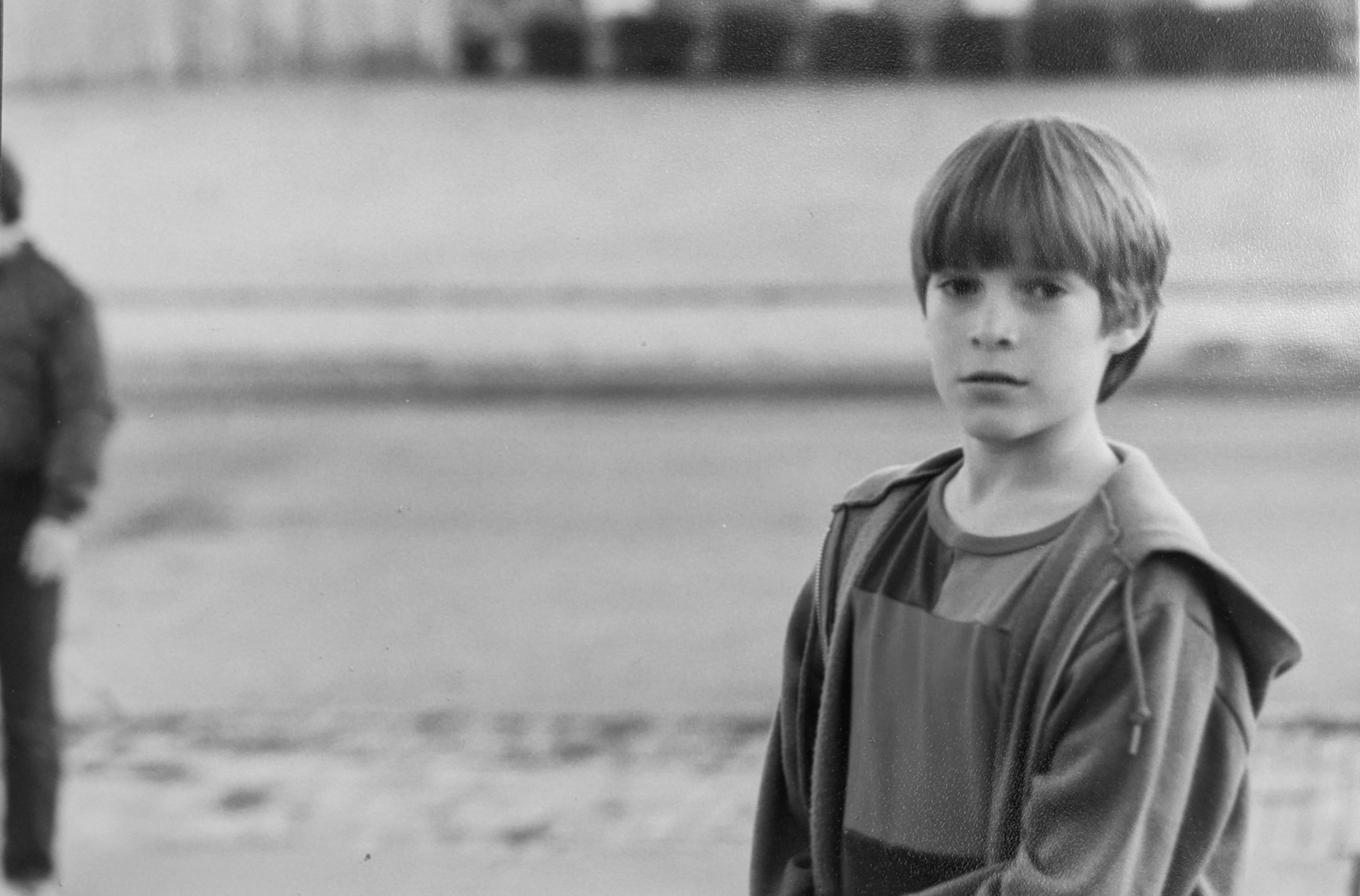
Pale thorns reach from emerald wings. I kneel in the clay-dirt and pinch the root stem of bull thistle. Exhume. Blood drops gather and wash my calloused fingers. I twist at the wrist, and the outdoor faucet beneath the window screeches. Water traverses the slight hill via hose, a green snake with a yellow stripe and coiled metal skin, up to the bent rim of a mouth. The blood from a thorn prick washes to the ground, blood to clay, dust turned into mud. I leave the finger alone while I check the lawn for more weeds. Fifth grade is over, and the mood is serious. My parents decided to own a house but ignore its unkempt appearance. Outside Dallas, I stand still and smell the summer’s sour shore of Lake Ray Hubbard.
Two-stroke engines circle the house where I now rent a room for grad school. I set the alarm, lock the door, cross the immaculate lawn. The undertow awaits a final gesture: the hoses to split, the sprinklers will rust. My footsteps catch chemicals as I rush past unfinished houses, where fingers of PVC pipes pierce foundations and rise with future walls framed in pine. My family lives far away, each member settled in a different city. I jaywalk to class. Fungus stirs around me as a leaf blower approaches. Dead maple leaves and Halloween candy wrappers knot and molt in pits. The machines multiply; two-stroke choruses pitch, rise and plummet. And rise. My stomach speaks, but the noise covers. I cross the street and breathe inescapable fumes, consider the toxins my cousin listed after surviving cancer. “Two-stroke to death,” he said. My breath holds as I reach the campus that is a park, gone mad with small motors.
Sixth grade ends the summer. The yellow bus travels the neighborhood horizon, its diesel motor mumbling between stops. Soon the upright vessel will emerge around the street corner and transport us to school. Now I stare at the camera—Mom’s excitement about the first day. My brother perches out of frame, a half shoulder in a maroon Members Only jacket. He signals to our proud photographer to go inside the house, leave us to it. How does our family afford the camera, the trendy jacket brand, or last week’s foundation repairs on the house? Why neglect the lawn and stain the block? I smell green leaf volatiles.
The summer leaves us at the bus stop. The neighbor kids can see that my family allowed weeds to grow. They associate us with the bald patches of a certain yard lifestyle. I spent summer hours on knees on the ground where my mom now stands, camera in hand, where the porch meets cakes of earth. I thought I had enough time to control the deadnettle infestation.
Where I stand, centered in a camera’s frame to become a glossy paper memory, our neighbor across the street mowed her lawn, wearing cowboy boots and a leopard-print bikini. I can’t see my own sad face, watching Mom record our annual return to school. Where I stand, not a single blade escaped the mower and weed eater. The bikini neighbor’s lawn mimics a soft screaming brick that smells like a warning agent.
Middle school begins.
Homeroom sixth graders remember my brother wearing the same plaid shirt I wear, the same abstract logo that wasn’t a horse with a polo stick. Last year we shopped at Marshalls, far away from our school district. We crossed lakes and a highway interchange of concrete planks pitched high enough that if children threw stones from the sides, the landing could shatter someone. My outfits are misfits. The belt loops misplaced. The sleeves too long. I roll the cuffs. I shift my belt buckle to the left. Mom hems the legs and says it could be worse; we think about what’s coming.
I want to be cast in a movie about the comfortable kids in Rockwall. As background actors my family members and I will say, “Peas and carrots, peas and carrots, watermelon.” The camera will believe our conversation is real. Believe we enjoy block parties, fences, Dad’s Bible talk. The audience will assume we own the two vehicles in our driveway and that we chose the clothes we wear. Our verdant lawn will inspire people to walk barefoot. The end credits of this movie will include kid neighbors who brought their relatives and friends to the local premiere. I’ll stand outside the theater’s glass doors, wearing boots, and flatten the spidery weeds piercing the front sidewalk. If I’m cast in the movie.
The gardening gloves do not fit. My family doesn’t fit. I want to fit in, like a pleasant neighbor with unblemished skin. I start laundry loads late at night. I don’t notice what happens to my breath when my brother teases me about my lawn care hours and the grass stains on the knees of jeans. Scuffs and dirty fingernails gather attention at the dinner table. I hide the finger cut. The small hole that speaks. I ask Mom to pass the salt. I ask for gloves that fit. My father builds cabinets and attends church at least five days and nights weekly, giving to God. Mom sees through her children’s smiles. If she heard one of her sons talk about the yard progress she would laugh. She would know something. She asks me to sit still at the table and chew before swallowing.
Mom balances accounts in an office for ten hours each weekday and formally complains about the death of the lunch hour. The boss touches her skin, threatens then terminates her job. She wants to tell her therapist about the boss’s musty breath and his motions but shares a counseling room couch with her children. Our father refuses to attend, which allows us to use the words abuse and mental illness. I share what our neighbors must think. The therapist asks me to continue improving the lawn. Each week, the counseling fee is waived, and Mom saves for the end of a marriage. She steps out of the car and over piles of dried weeds in the summer, right where our porch meets the clay holes in the lawn. My hobby display. She points out a few patches of grass. She wants to hold her mom’s stemware in hand, a daughter again, possessing something elegant and cool and not alive. Her tiny fingers stirred her mom’s martinis like an expert.
The undertow exhumes. Grad students without cars walk miles through the Tudor home neighborhoods of Bronxville, New York. The exterior walls of stacked stones, white bricks, and leaded pane trap moisture and sounds. The clay-dirt loosens underfoot. I borrow to be here.
The alarm code will change at home, any day. I look out the window and fold arms over my chest, over the shirt still missing the horse logo in sport. The lawn is pure fine fescue. I grip a fork in the kitchen, stand and chew leftovers while holding a plate. I wait for the husband across the street to greet me in the decorated dining room where I rent. “Please, sit,” he’ll say over the shiny table, his shirt and face sprayed with hobbyist sawdust. The hearing loss will rev his voice as he starts and stops like metal teeth splitting sheets of plywood. “Why do you want to live here, Casey?”
I’ll say, “My dad was a carpenter, too. But no hobby.”
I expect to move in the winter, traipsing the lawn through snow blankets. I expect leaf blowers and snow blowers to chase me into the dark of my rented moving van, where I will bend knees before disassembled shelves and boxes of books. I will exclaim how I loathe moving, how I can’t afford the neighborhood, and I was never a neighbor but a witness, hiding the rosette scar on my finger, a hyphen stain at the bone.
The lawn doesn’t need me. The mowers and blowers and off-season eaters idle as I go. The front door key slips from the jean pocket hole into the snow, where the porch pavement ends and feet sink.
Casey Haymes is the most famous writer you’ve never heard of. He earned an MFA from Sarah Lawrence College and teaches creative writing and research at The New School. He’s finishing a novel about a cold case, family grief, and ghosts.

